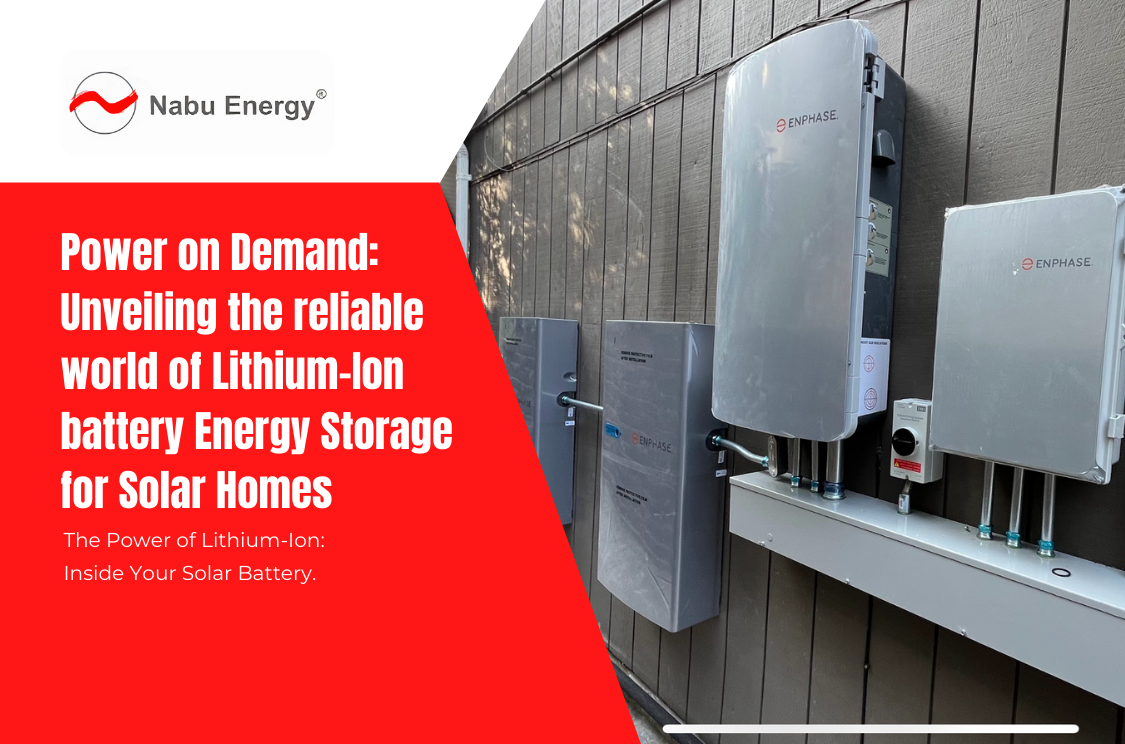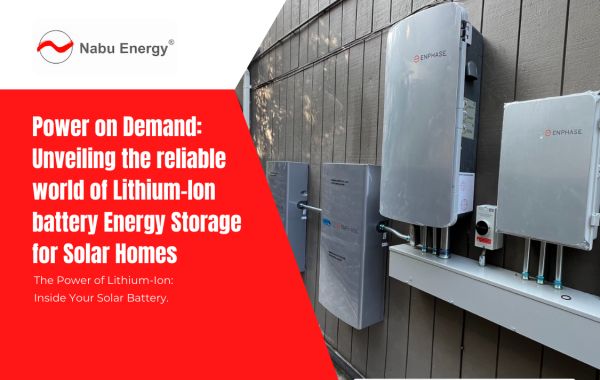The sun is a powerful source of clean energy, but its availability can fluctuate throughout the day. This is where battery energy storage (BESS) steps in, acting as your personal solar power bank. It captures the excess energy generated by your solar panels during peak sunshine hours and stores it for later use, ensuring a steady flow of clean energy even when the sun goes down. But how exactly do these batteries work, and are they reliable enough for your long-term solar investment?
The Power of Lithium-Ion: Inside Your Solar Battery
Lithium-ion (Li-ion) batteries are the undisputed champions of residential solar storage. Here’s a deeper dive into how they work:
Electrochemical Reaction: At the heart of a Li-ion battery lies the movement of lithium ions between two electrodes – a positively charged cathode and a negatively charged anode. During charging, electricity flows into the battery, causing lithium ions to de-intercalate from the anode and intercalate (embed) themselves into the cathode. This process stores the energy within the battery’s materials. When you need power, the process reverses. The lithium ions flow back from the cathode to the anode, generating electricity that flows out of the battery to power your home.
Different Chemistries, Different Benefits: Li-ion batteries come in various chemistries, each offering unique advantages. Lithium iron phosphate (LFP) batteries are known for their exceptional safety, long lifespan (up to 30 years), and high tolerance for high temperatures. Lithium nickel manganese cobalt (NMC) batteries boast higher energy density, allowing them to store more energy in a smaller space. However, they may have a slightly shorter lifespan compared to LFP.
The Cutting Edge: Recent Developments in Residential Battery Storage
Innovation in Li-ion technology is constantly pushing the boundaries of residential battery energy storage:
Second-Life Batteries: As the electric vehicle (EV) industry matures, a new opportunity arises – repurposing used EV batteries for home solar storage. These “second-life” batteries offer an eco-friendly and cost-effective way to expand storage capacity.
Virtual Power Plants (VPPs): This emerging technology connects multiple home solar batteries into a virtual grid. VPPs can collectively buy and sell electricity to the grid, offering homeowners additional revenue streams and contributing to grid stability.
Smart Battery Management Systems (BMS): Modern BMS are becoming increasingly sophisticated. They not only monitor battery health and performance but can also learn your energy usage patterns and optimize charging and discharging cycles for maximum efficiency and lifespan.
Built to Last: The Enduring Reliability of Lithium-Ion Batteries
One of the biggest concerns homeowners have about Battery Energy Storage (BESS) is battery reliability. Here’s why you can be confident in your Li-ion battery’s longevity:
Rigorous Testing: Manufacturers subject their batteries to extensive testing, simulating extreme temperatures, rapid charge and discharge cycles, and potential safety hazards. These tests ensure the batteries meet rigorous standards before reaching your home.
Advanced Battery Management Systems (BMS): Modern BMS play a critical role in safeguarding your battery’s health. They constantly monitor the battery’s temperature, voltage, and current, preventing damage from overcharging or overheating.
Long Lifespan: Li-ion batteries used in solar storage are designed to last for 10 to 15 years, with minimal degradation in capacity over time. This translates to reliable energy storage for decades.
Manufacturer Warranties: Most reputable battery manufacturers offer comprehensive warranties, typically ranging from 10 to 12 years. These warranties cover defects in materials and workmanship, providing peace of mind for your investment.
Choosing the Right Battery Manufacturer: A Key Decision
While Li-ion technology is inherently reliable, selecting the right manufacturer plays a crucial role in ensuring long-term performance. Here are some factors to consider when selecting a battery for your solar system:
Track Record: Look for a manufacturer with a proven record of producing high-quality, reliable Li-ion batteries. Research the company’s history and customer reviews to get a sense of their reputation.
Warranty Coverage: Compare warranty lengths and terms offered by different manufacturers. A longer warranty with clear coverage for defects and capacity degradation indicates the manufacturer’s confidence in their product.
Safety Certifications: Ensure the battery you choose meets all relevant safety certifications established by independent organizations. These certifications guarantee the battery adheres to rigorous safety standards.
Partnering with a Reliable Solar Installer
When it comes to battery storage, working with a reputable solar installer like Nabu Energy is crucial. As one of the leading solar panel installers in California and home battery storage installation experts, we can help you choose the right Li-ion battery based on your specific energy needs, budget, and future considerations like potential VPP participation.
At Nabu Energy, we specialize in providing top-tier solar solutions for homeowners across the state. Whether you're located in the Bay Area or elsewhere in California, our team ensures that you receive the most reliable and cost-effective solar battery backup installation. As one of the best solar companies near me, we take pride in helping our clients maximize their energy savings while supporting a greener future.








